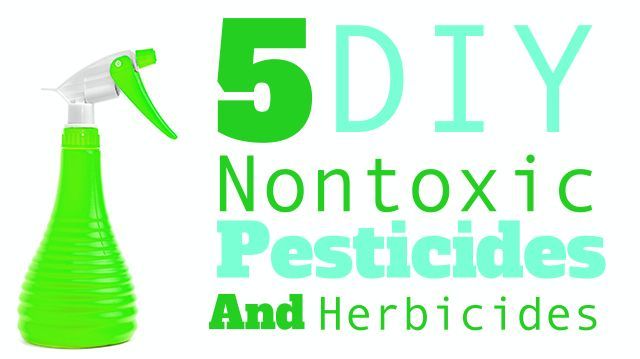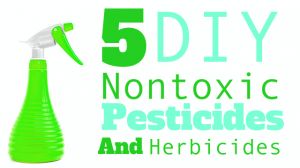
Gardening organically can greatly reduce the need for synthetic inputs such as pesticides and herbicides. While some plants are naturally resistant to weeds or bugs, others can remain susceptible regardless of your gardening method.
To treat these plants, organic pesticides and herbicides can be purchased at most home and gardening centers. Different problems require different solutions though, and the best way to maximize control over your garden is to do it yourself. Here are some natural, homemade pesticides and herbicides that can help you reclaim your garden without the use of harsh chemicals.
Alternatives to herbicides
Transplanting
Weeds are pesky little plants that can steal vital nutrients from your crops. Some weeds are edible, however, and can be highly nutritious. Dandelions, red clovers, plantain weeds, garlic grass, sorrel, watercress, chickweed, lamb’s quarters, burdock, purslane, mallow, wild amaranth and curly dock are all edible weeds that you can save. Instead of killing these delicious plants, transplant them in a separate container or raised bed so they can grow in abundance and leave your other crops alone.
Plant blocks
Some plants are so sturdy that they can act as blocks against weeds. Crops such as asparagus, rhubarb and fruit trees can often withstands even tall weeds. Other plants such as snow-in-summer, barren strawberry and Japanese pachysandra grow rapidly and do not give weeds the chance to steal their nutrients. Use these plants to prevent weeds from getting to your other crops.
Removal
The most common way to get rid of weeds other than herbicides is to simply pull them out of the ground. Although this method is time consuming, it is the most effective of the non-herbicide ways to eliminate weeds.
Smothering
For small weeds, you can also smother them with newspaper or mulch. This also works to prevent them from growing in the first place. Although this is highly effective for only smaller weeds, by using this method alone, you are reducing the overall amount of weeds in your garden. So if you begin to notice a few larger, more sturdy weeds taking shape around your plants, you can simply remove them by hand.
Do-it-yourself herbicides
Other than hand-removing weeds, using a herbicide is the most effective way to ensure that your plants aren’t competing for nutrients and sunlight. Here are five natural herbicides that you can try. To use, just pour or squirt these ingredients over your weeds and watch them disappear like magic.
- Boiling water
- Table salt
- Vinegar
- Essential oils: cinnamon oil, clove oil or citrus oil
- Soap
Do-it-yourself pesticides for specific bug problems
Ants
Ant piles taking over your garden? Stomp them out without harmful ant sprays by using natural ingredients. Grind up organic popcorn kernels or use cornmeal to get rid of their colony. It’s not as fast as store-bought chemicals, but it’s effective nonetheless and it’s much safer.
Small bugs
You can get rid of small pests easily by hand-removing them with a piece of tape. If you find them on strong, thick plants, they can also be dislodged by spraying them with a strong water hose.
Spider mites
To get rid of spider mites, spray them with warm water that is infused with Himalayan sea salt. Mix two teaspoons of sea salt with a gallon of water to be effective.
Natural, all-purpose pesticides
Compost tea
 Compost tea does not actually involve tea. It’s just watered compost that has been air-dried. This is not meant to kill bugs after they have taken form. Instead, compost tea prevents bugs and diseases from taking hold of your crops. Apply like you would any compost. As an added benefit, it helps your plants to grow and rejuvenates the soil and roots.
Compost tea does not actually involve tea. It’s just watered compost that has been air-dried. This is not meant to kill bugs after they have taken form. Instead, compost tea prevents bugs and diseases from taking hold of your crops. Apply like you would any compost. As an added benefit, it helps your plants to grow and rejuvenates the soil and roots.
Garlic and onion
Pulse one garlic clove and one medium onion in a high-speed blender or food processor. Add the mix with one quart of water and allow to sit for a few minutes to diffuse. Spray the infused water onto your plants.
Hydrogen peroxide
Just spray or pour hydrogen peroxide onto your plants as a simple pesticide.
Citrus oil recipes
Ten drops of citrus oil can be mixed with a dash of cayenne pepper in a cup of warm water as a spray. Or you can mix ten drops of citrus oil in a cup of hot, soapy water and use that as a spray instead.
Peppers
As mentioned above, cayenne pepper works great with citrus oil as a natural pesticide. Chili pepper can also be used with water to kill bugs. Add two handfuls of dried chili peppers to two liters of water. Allow it to sit overnight and spray onto crops.
These are just some of many ways to kill bugs and weeds naturally. What are some methods you have tried? What have you found that works? What doesn’t work? Let us know in the comments below.
-Nicole Manuel
Nicole Manuel, CPC is a certified life coach with a degree in economics and over five years of professional writing experience. Her goal is to help others discover ways to incorporate sustainable solutions that can improve their health and well-being on a budget.
Sources:
http://mastergardeners.ext.wvu.edu/r/download/41572
http://stlucie.ifas.ufl.edu/pdfs/master_gardener/Home%20Remedies%20for%20Insect%20and%20Disease%20Control%20on%20Plants.pdf
http://www.globalhealingcenter.com/natural-health/organic-pesticides
http://lifehacker.com/kill-ants-safely-with-cornmeal-510414551
http://www.seriouseats.com/2013/03/diy-cornmeal-from-popcorn.html
http://www.finegardening.com/35-pest-and-disease-remedies
http://lifehacker.com/5904019/diy-natural-garden-pesticides
http://www.goodhousekeeping.com/home/gardening/advice/g777/homemade-weed-killers
http://www.doityourself.com/stry/how-to-make-your-own-herbicide#b
http://www.treehugger.com/lawn-garden/homemade-herbicide-kill-weeds-without-killing-earth.html
http://www.goodhousekeeping.com/home/gardening/advice/g2272/weeds-edible-plants-0409/?slide=1
http://www.treehugger.com/lawn-garden/eat-dandelions-9-edible-garden-weeds.html
http://www.ehow.com/list_7835646_plants-kill-weeds.html
http://budgeting.thenest.com/organic-way-kill-weeds-31209.html
http://thebestgardening.com/recommendations-for-an-ultra-low-maintenance-food-producing-garden

